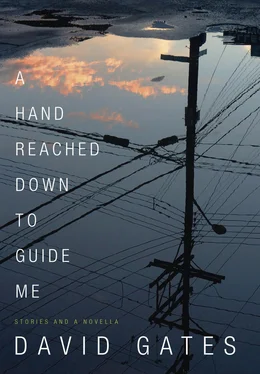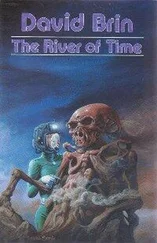Up in Elena’s bedroom, thank God, there’s a big floor fan; Lily puts it on the highest speed, opens a window and goes back downstairs for her duffel and her wheeled suitcase. She takes her orange plastic box of weed out of the zippered compartment and puts it in the freezer, between a pint of Häagen-Dazs vanilla and a bottle of Stoli. Any one of these three things could lead to the other two. But she goes to bed without. Isn’t that what she’s been doing?
In the morning, she makes coffee in the Hagertys’ French press and takes it out to the shady porch (“Please do not leave food on the veranda—we get the occasional raccoon”) along with a bowl of the muesli she found in the cupboard. The box says both “no sugar added” and “not a low-calorie food”: mixed signals, as if from a man!
Driving into town along the shore of the lake, she spots a farm stand: a rustic wagon that holds an array of tomatoes, squashes, ears of corn. Then a bar called Tony’s, with a green canvas awning. The town is a two-block main street without parking meters; she finds the video store, the organic market and the wine shop, where she is to ask for Victor. A tiny hair salon, so wittily called Delilah’s. In the wine shop, she buys a seventy-five-dollar bottle of sherry—yes! inspired!—for movie time. The younger, more handsome of the two men, the one with the curly hair, must be Victor. Oh, just a guess.
On the way back, she slows down for a better look at this Tony’s, although bars are not in the plan, then stops at the farm stand and buys zucchini, yellow summer squash and a fat tomato. It’s when she opens the kitchen door that she makes her discovery: she’d closed the downstairs windows so nobody could get in, and now it’s actually cool in here. Not a word of this in Marian Hagerty’s note!
She puts on her black bikini and checks herself: today is a good day. She and Portia had been issued the wrong bodies, back in the antecedent life. Lily has the ectomorphic mind—even the ectomorphic name—while portly sounding Portia stole the show, slinky-limbed, in the one ballet recital they did together. After that, Lily begged to take tap instead—all those old musicals their father made them watch—then refused to go when she learned the students had to wear tights: you could see the flesh shaking even on Ruby Keeler’ s thighs, for Pete’s sake, when she tapped in 42nd Street .
At the lake, she spreads one of the Hagertys’ towels on the grass and takes her sweet time unbuttoning her shirt, sliding her jeans off, arching her back. From behind her sunglasses, she looks around her: all moms and kids, which is just as well. No, truly. The water’s warm at the surface, icy when you dive down. When she comes out, her body feels cool at the core, and lying down in the sun she’s so calmed it’s disturbing.
She eats a dinner of brown rice with zucchini and garlic, sliced tomato on the side. Then she goes up to Elena’s room, pulls down the shade, slips panties off one leg and thinks up Garrett in the taxi, her hand down the front of his jeans, her other hand down the back, then thinks up reaching into Elena’s blue dress—it’s vacation!—and touches her own breast with her free hand, then brings Garrett back in to play with her and Elena: even alone, you can’t know who’s watching. She makes herself come, twice, in Elena’s bed. Outside it’s still daylight.
—
When they went through her father’s things, Lily took a white shirt with a Brooks Brothers label and his razor, with which she now shaves her legs. In the back of his closet, she found the framed photo of the Shelley Memorial at Oxford that used to hang above the desk in his study; when he got sober, he’d replaced it with a photo of their cottage in Dennis Port. (“What’s your favorite sport?” her father would ask them, turning his head to the backseat, and they would shout back, “Dennis Port!”) When she was little, she would go into the study to look at it: a statue of a beautiful naked drowned man lying on his side; you could sort of see his junk. Neither her mother nor Portia had wanted the thing, so Lily hung it over her nonworking fireplace in Brooklyn. Sometimes she thinks it’s bringing her bad luck. But didn’t she already have that?
Except during the couple of years before he went to Silver Hill, Skip Kiernan had continually reread Shakespeare, Johnson and Wordsworth; their subliminally channeled cadences, he believed, had saved some corporate criminals from doing serious time. He used to pay both his daughters ten cents a line to memorize poems and recite them while he sat in his leather armchair with his drink. Portia stopped because it was babyish, but one night Lily made five dollars on Emily Dickinson. When Lily finally found a full-time job, copyediting at an upmarket bridal magazine, her father offered her ten thousand dollars, on top of her tuition, to quit and go get what he called “your Ph.D.” Behind Matt’s back. So now Matt’s out of the picture, she’s lost the job anyway and she’s just turned thirty-three. Should it be “Woe is me” or “Woe am I”?
Lily was in Amsterdam with Matt when Elena was shot by bandits in Malaysia, where she’d gone to work with Catholic Charities. “They had all that trouble with her,” Lily’s father said, “finally she gets her act together, and now this. Don’t you go doing good in the world.”
“Yeah,” Lily said, “what are the odds.”
—
The next morning she goes into the video store on the chance they might have Gold Diggers of 1933 , which she was stupid not to have brought.
“I knew it,” the man at the counter says. “No. I’m sorry, we should.” His short blond hair’s just starting to go gray, and he’s got lines at the corners of his eyes and the beginnings of man breasts under the knit shirt.
“Oh, it was just a whim,” she says. “I’m afraid if I start browsing, I’ll never get out of here.” Already she’s spotted Carnival of Souls .
“That wouldn’t break my heart,” he says. Straight for sure, just unappealing. “If you find yourself jonesing for something, here’s the number.” He hands her a card. “Ask for Evan.”
Well, it’s a day for whims, isn’t it? Walking past the hair salon, she sees that both chairs are empty—and there’s your gay boy. Maybe. He’s got a shaved head, and he’s wearing a Hawaiian shirt. “Don’t be bashful,” he says when she sticks her head in. “Come. Sit.” A boom box on the glass shelf is playing the Robert Plant–Alison Krauss CD that everybody’s sick of back in the city. “First let me get a look at the lay of the land, and then we’ll shampoo you.”
He’s got strong fingers—she can feel her scalp move on her skull—and he’s rough with the towel. She’s still not sure about him. “So,” he says, walking her back to the chair, “what are we doing today?”
“Something we may end up regretting,” she says.
—
On the drive home—why not call it that?—she keeps pulling down the visor to check herself in the makeup mirror. The sky’s getting dark to the west; when she gets out of the car she hears faraway thunder. Excuse enough to bag the swim. She allows herself a few minutes in the bathroom to turn her head from side to side in front of the mirror; she hadn’t realized her ears were so big. She takes a shower, puts on her father’s big white shirt, then goes out to the porch, lies in the hammock and tries to stop touching her hair and get serious about Mansfield Park . Maria has fled with Henry Crawford—and Mary Crawford has proved so deficient in moral sense that she merely calls it “folly”! When the storm hits, she closes the book to watch: hailstones bouncing off the lawn, big trees waving like feather dusters—isn’t that good? Better write that one down.
Читать дальше











